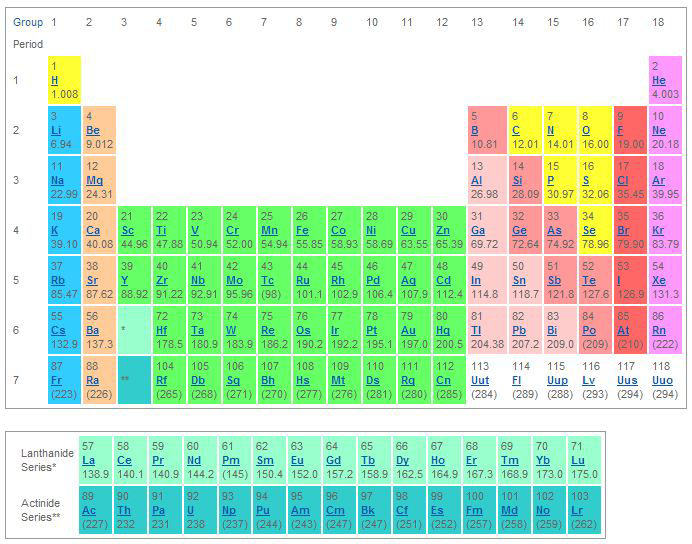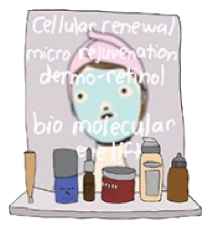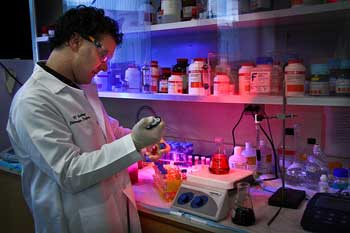
Source: Periodic Table of Elements, Los Alamos National Laboratory (LANL)
Science uses prefixes and suffixes every day. In fact, some of the words containing affixes may be familiar to you. Review the following table, which lists affixes, their meanings, and example words. Some of the scientific terms and affixes may be new to you; others you may already know.
|
Affix |
Meaning |
Prefix or Suffix |
Example |
|---|---|---|---|
|
anti-, ant- |
without |
prefix |
antipollution, antacid |
|
bio-, bi- |
life, living organism |
prefix |
biology, biotechnology, biopsy |
|
hyper- |
excessive or over |
prefix |
hyperactive, hypersensitive |
|
-graph |
something written or drawn; an instrument for writing, drawing, or recording |
suffix |
phonograph, seismograph |
|
-phobe, -phobia |
one that fears a specified thing; an intense fear of a specified thing |
suffix |
agoraphobia, xenophobe |
|
-logy |
discourse, expression; science, theory, study |
suffix |
biology, dermatology |
Now that you have reviewed a few science affixes, read the passage that follows. It discusses how companies sell products to women through the creative use of affixes.

Source: Anni Arnold, New York Times
Let’s Play Buzzword: Defining Phrases Used in Skin Care Advertising
- Once the province of academic journals, the latest concepts in science are trickling down to fashion magazines in the form of advertising campaigns for beauty products.
- This month, for example, advertisements for the Olay Regenerist line of face treatments tout the company’s “Aquacurrent Science” as a skin care technology “that helps reverse the look of lines and wrinkles.” According to promotional material, the technology was inspired by the discovery of aquaporin water channels (pores that conduct water in and out of cells) for which Dr. Peter Agre won a Nobel Prize in chemistry.
- Meanwhile, from L’Oréal comes Skin Genesis. The line includes a gel cleanser that offers “cellular level cleansing,” according to magazine advertisements.
- Medical-sounding affixes like bio-, micro- and pro- also abound (think biologic, microscopic and probiotics). Some terms found last week at cosmetics retailers and in fashion magazines included: “biomolecular” eye cream; “microtechnology bio active” foundation; “pro-collagen” serum; “microsmoothing” face serum; and a “bio-stimulating” night cream with “microlift.”
- Erin McKean, a lexicographer who is the editor of the second edition of the New Oxford American Dictionary, offered a more textual analysis. Words and phrases like cellular, regeneration, bio-stimulating and cell-strengthening connote health, she said.
- “The idea is, it is not vanity, it is medicine,” Ms. McKean said. “Sure, you are going to look great, but what you are really doing is helping your skin on the inside.”
Let’s begin with the word Regenerist found in the 2nd paragraph. What do you think “re” means? Re- can be found in the words redo, reread, and refund. Re- is Latin and means “again.”
What do you think “generist” means? Can you break this word into a root word and a suffix? “Gener” and “ist” are both parts of the larger word but are dependent on each other to create this fun new word. When I think of “gener,” I think of the words generation, genetics, and genes. This word comes from the Latin root gen and originally was generare, which means “to create.” The suffix “er” means “someone or something that does,” so gener means “someone who creates.”
There’s also the suffix “ist” at the end of Regenerist. “Ist” reminds me of the words dentist, motorist, and Buddhist. It looks like this word refers to people who perform or take part in a specific activity. In this context “ist” is probably “something or someone who takes part in or performs a specific action.” So putting the words together would look like this:
|
Re + gener + ist = Regenerist |
||
|---|---|---|
|
re- = “again” |
gener = “create” |
-ist = “taking part in a specific action” |
|
regenerist = something that takes part in creating new cells (again) |
||

Let’s practice breaking down some words to discover their meanings. Start with the word “aquacurrent” from the second paragraph. Using your notes, answer the questions that follow. When you are finished, check your understanding.
- What words do you think “aqua” is similar to, or what words contain “aqua” as part of the word?
- What do you think “aqua” means?
- What do you think “current” means?
- What do you think “aquacurrent” means?
Sample response:
- “Aqua” is similar to aquatic, aquamarine, and aquarium.
- Each of these words pertains to water, so you won’t be surprised to learn that “aqua” is Latin for “water.”
- You know that both water and electricity contain “currents,” so you can guess that “currents” are about “flow.”
- “Aquacurrent” could mean “water flow.”

Source: Anni Arnold, New York Times